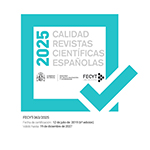The Power of Necropolitics: Affect Theory and Violence in Perspective
Abstract
This article offers an overview of the central arguments and theoretical contributions of affect theory insofar as they are interrelated to and connected with feminist thought. Necropolitics or the right to kill or to destroy is the theme of this two-part essay. This first section points to how the affective turn presents a return of critical theory to bodily matter. Of special importance is the argument regarding the specific manner in which affective studies enable a strong grounding for social action and change by centering its theorizations on interpersonal and relational issues. Whereas the first part of this essay traces a panorama of how the affective proposes a new methodology for thinking about sentience and responsibility, the second section pays special attention to the entanglement of violence and heteronormative affections. The focus is on political violence, with particular attention paid to the Basque situation, on the inadmissible "right to kill" claimed by the warrior that involves a peculiar destructive (mis)understanding of community and of the self. Contrary to the necropolitical logic, the authors propose a feminist ethos linked to an understanding of the affective interstices that open up when emphasis is redirected from the anchors of social bonds/affects to those of direct interpersonal negotiation. In order to outline some of the affective movement entailed in the rethinking of identity in feminist terms needed for an undoing of the necropolitical energy in political violence—what Roland Barthes, terms "the neutral" (2005)—we focus on restorative justice and its affective universe
Downloads
Article download
License
In order to support the global exchange of knowledge, the journal Investigaciones Feministas is allowing unrestricted access to its content as from its publication in this electronic edition, and as such it is an open-access journal. The originals published in this journal are the property of the Complutense University of Madrid and any reproduction thereof in full or in part must cite the source. All content is distributed under a Creative Commons Attribution 4.0 use and distribution licence (CC BY 4.0). This circumstance must be expressly stated in these terms where necessary. You can view the summary and the complete legal text of the licence.











